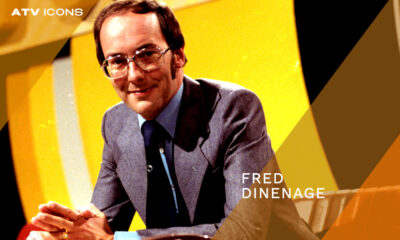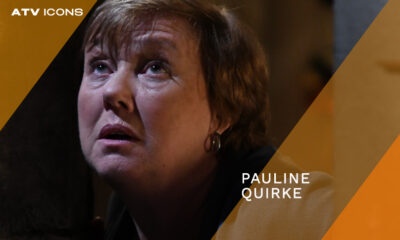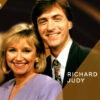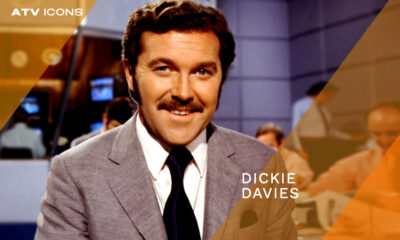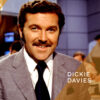
Icons
ATV Icons: Cannon and Ball
The latest stars to be inducted into the ATV Icons to celebrate 70 years of ITV are Tommy Cannon and Bobby Ball…
Thomas Derbyshire (Tommy Cannon) was born on 27 June 1938 in Oldham, Robert Harper (Bobby Ball) was born on 28 January 1944, also in Oldham. Both grew up in the working-class communities of Lancashire.
Before show business, Tommy and Bobby held blue-collar jobs – famously, they met in the early 1960s while working as welders at a local factory. As Bobby later recalled, he was often late to work and on his first day greeted Tommy with a casual “How are you, cock?” which broke the ice. The pair became friends on the job, bonding over humour and entertainment.
Outside of work, Bobby had been singing in local clubs since his youth, he invited Tommy to watch him perform at a working men’s club, and soon Tommy joined in. In their earliest foray into show business, they formed a small club act. At first, they performed as a musical trio and then as a singing duo. They adopted stage names like The Sherrell Brothers and later The Harper Brothers during these years. Initially, they were primarily singers performing popular standards at pubs, clubs, and weddings in the Greater Manchester area.
Within a couple of years, they realised that comedy was their true calling. In one early gig, after donning mismatched shiny shirts, Bobby joked that they “look like traffic lights” – it earned a small laugh and gave them a taste of comic applause. Crucially, they also learned that comedians earned about £3 more per night than singers on the club circuit, a significant incentive in those days.

Cannon and Ball / LWT
Tommy and Bobby decided to rebrand themselves as a comedy double-act. They experimented with their onstage personas to craft the classic “chalk-and-cheese” duo dynamic: Bobby evolved into the clownish, high-energy character with a baggy suit and trademark red braces to twang, while Tommy became the straight man in a sharp suit and glasses, trying to maintain order. By the early 1970s, they had renamed themselves “Cannon & Ball” – choosing Cannon after American singer Freddy Cannon, and Ball as a fitting name for the cheeky sidekick.
Like many British comics, Cannon and Ball spent years honing their act in northern clubs before finding mainstream success. They turned professional in the early 70s and endured a long “15-year slog” up and down the country performing in smoky pubs and variety theatres. Their first break in front of a national audience came when they auditioned for Opportunity Knocks (Thames Television), a popular ITV talent show.
They appeared on Opp Knocks in 1968, but their comedy routine came last on the programme, this setback did not deter them, “things like that shouldn’t put anybody off,” Tommy said of the defeat. Throughout the mid-1970s, Cannon and Ball gained more TV exposure by performing on The Wheeltappers and Shunters Social Club (Granada), a televised variety show recreating the northern club circuit atmosphere. These appearances helped them refine their act for the screen.
In 1978, they were booked to perform short spots on Bruce Forsyth’s Big Night (LWT) on ITV. Although not all their segments made it to air, ITV executive Michael Grade saw the unused clips and was impressed. Grade recognized their appeal and reportedly instructed his colleagues, “Give these two lads their own show.” This pivotal moment launched Cannon and Ball from club comics to TV stars.
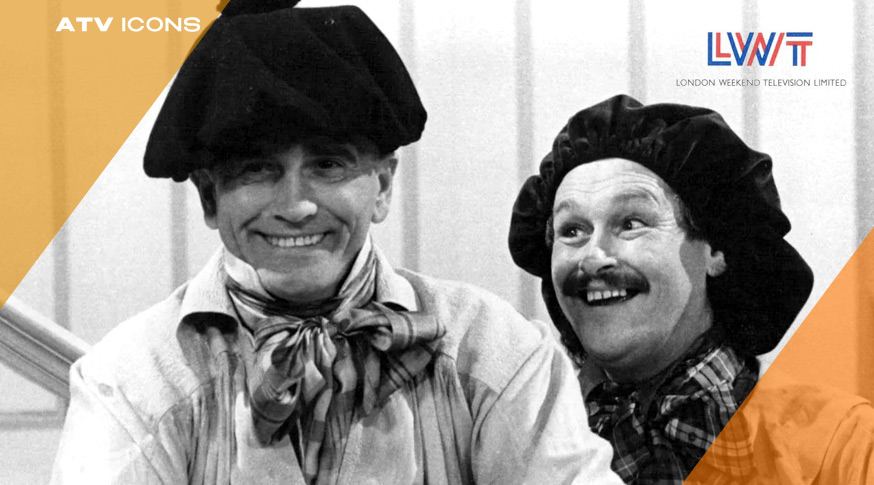
Cannon and Ball / LWT
In 1979, Tommy and Bobby debuted The Cannon and Ball Show, their own weekly primetime series from ITV’s London Weekend Television. The variety show, featuring Cannon and Ball’s comedy sketches and double-act routines, was a massive hit with family audiences on Saturday nights. It ran annually from 1979 to 1988, spanning nine series – with special holiday episodes also regularly pulling in millions of viewers.
At their peak, Cannon and Ball were said to be the most popular comedy double act on television in the 1980s – fulfilling a prophecy by the legendary Eric Morecambe, who shortly before his death had predicted that Cannon and Ball would inherit the comedy crown long held by Morecambe and Wise. Much like Eric and Ernie, Tommy and Bobby delivered a brand of “weekend TV entertainment” that was broadly appealing and family-friendly.
On The Cannon and Ball Show, Tommy Cannon played the straight man – calm, but often exasperated – while Bobby Ball was the impish comic foil with his unruly black hair and cheeky grin. Bobby’s onstage antics included pratfalls, silly faces, and constantly snapping his red braces. Their interplay and catchphrases became nationally known.
Bobby’s signature line, “Rock on, Tommy!”, delivered in a Lancashire accent to mock-encourage the often-flustered Cannon, entered the pop-culture lexicon. The duo’s chemistry and timing, developed over years of club work, translated into a warm comedy style that audiences loved. “We do naughty stuff. It’s more ‘cheeky’,” Ball said, explaining that they avoided explicit or “blue” humour in favour of innuendo and slapstick suitable for all ages.
This conscious choice made their show one that parents could watch with children, a key to its broad appeal. In 1981, at the height of their fame, Cannon and Ball were even the surprise subjects of the classic TV biography series This Is Your Life (Thames Television) By the mid-1980s, with millions tuning in to their show, Cannon and Ball were firmly entrenched as Saturday night TV royalty.

Cannon and Ball / LWT
Later in its run, The Cannon and Ball Show experimented with format. In addition to stand-up and sketch segments, the show incorporated situational comedy elements in some episodes. One recurring sketch placed Tommy and Bobby in a sitcom-style scenario as two northern lads sharing a flat in London while working “down south.” This proved popular and led ITV to develop standalone scripted projects for the duo.
In 1986, they filmed a one-off special called Cannon and Ball’s Casino, a part-comedy, part-game show hybrid, and in 1990–91, LWT produced Plaza Patrol, a sitcom starring Cannon and Ball as incompetent security guards (Tommy as Bernard Cooney and Bobby as Trevor Purvis) patrolling a shopping mall named the Margaret Thatcher Plaza. However, the rise of ‘alternative comedy’ in the late ’80s meant traditional variety acts like Cannon and Ball had a harder time securing new TV hits.
However, at the peak of their television fame, Cannon and Ball also made a leap to the big screen. In 1982 they starred in a feature film, The Boys in Blue, a broad police comedy loosely based on a 1938 Will Hay film, Ask a Policeman.
Tommy and Bobby played dim-witted village policemen trying to save their rural police station from closure by inventing a crime wave. The Boys in Blue showcased the duo’s slapstick chemistry, but it met with poor critical reception and is remembered as their only major cinema outing. The movie did, however, cement some of Cannon and Ball’s stock comic personas – essentially as two well-meaning but hapless characters, mirroring their stage act dynamics.

Cannon and Ball / LWT
Cannon and Ball didn’t abandon family entertainment after their ITV series ended. In the 1990s, with new comedians dominating television, Tommy and Bobby returned focus to live performances; but still kept a hand in media. Bobby Ball, in particular, began to cultivate an acting career outside the double act. He took on small acting roles in TV dramas and sitcoms, showing a talent for character acting. In 2005–06 he had guest roles in the nostalgic police drama Heartbeat (Yorkshire TV), playing a kindly roofer, and in 2012 he appeared in the medical drama Casualty (BBC). Bobby also created a children’s animated series for the BBC – Juniper Jungle, which aired in 1992.
Decades after their initial fame, Cannon and Ball found new popularity with younger audiences by venturing into reality television. In late 2005, the duo jointly entered the jungle for I’m a Celebrity…Get Me Out of Here!
Appearing as themselves, the pair charmed viewers with their humour and camaraderie. They were eventually voted out in a tie for sixth place, but their stint on I’m a Celebrity introduced them to a 21st-century reality TV fanbase. In 2012, they took part in another reality program, Celebrity Coach Trip, where they toured Europe on a bus with other famous faces. And in 2018, they featured in the ITV documentary series Last Laugh in Vegas, following veteran British entertainers performing in Las Vegas. These appearances showed that even in their seventies, Cannon and Ball’s ability to entertain was undiminished.
Live performance was the bedrock of Cannon and Ball’s career, and they never gave it up even when television beckoned. Throughout the late 1970s and 1980s, in between TV recording schedules, the duo would embark on extensive theatre tours. In fact, their TV fame only amplified their stage success: “Their own TV programme helped to fill theatres,” noted The Guardian.
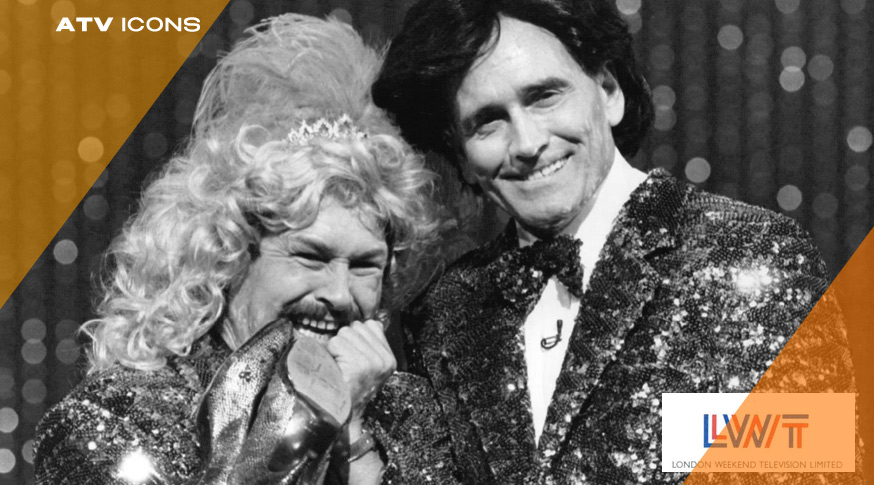
Cannon and Ball / LWT
In 1983, at the height of The Cannon and Ball Show popularity, they set a touring record for a variety act – performing 134 shows in 45 theatres over a 13-week spring tour. This intense schedule – often doing two shows a night in different towns – demonstrated both their work ethic and their massive public demand.
The duo also became a staple of seasonal stage entertainment, especially pantomime.
In their later years, Tommy and Bobby enjoyed a gentle resurgence through acting parts on television sitcoms. One of Bobby Ball’s most celebrated later roles was Frank in the hit BBC sitcom Not Going Out. From 2009 until 2019, he had a recurring part as the dim yet lovable father of Lee Mack’s character, appearing regularly and stealing scenes with his comedic timing; Bobby also portrayed Barry Harris, an aging rocker, in the ITV comedy-drama Mount Pleasant from 2011 to 2017. Additionally, Bobby made guest appearances in the comedy Benidorm and in the long-running sitcom Last of the Summer Wine. In a fun twist, Tommy Cannon joined Bobby in a few Last of the Summer Wine episodes in the late 2000s, effectively reuniting the double act on screen as two old pals getting into mischief in the Yorkshire countryside.
Tommy Cannon himself took on some acting challenges later in life. In 2019, he was cast in the popular ITV soap opera Emmerdale, playing a character named Derek (a pensioner whose storyline had unexpected consequences for the show’s regular characters. Though it was a short guest stint, it showed Tommy’s willingness to branch out even in his 80s. Tommy also made a cameo in the 2014 Not Going Out Christmas special, appearing alongside Bobby once more.
Throughout the 2000s and 2010s, the pair continued to appear together in commercials and charity specials, most notably in the telly ads for Safestyle UK windows, where slapstick was once again used with their pairing. They also took part in several guest spots, such as a special Children in Need edition of Pointless in 2013.
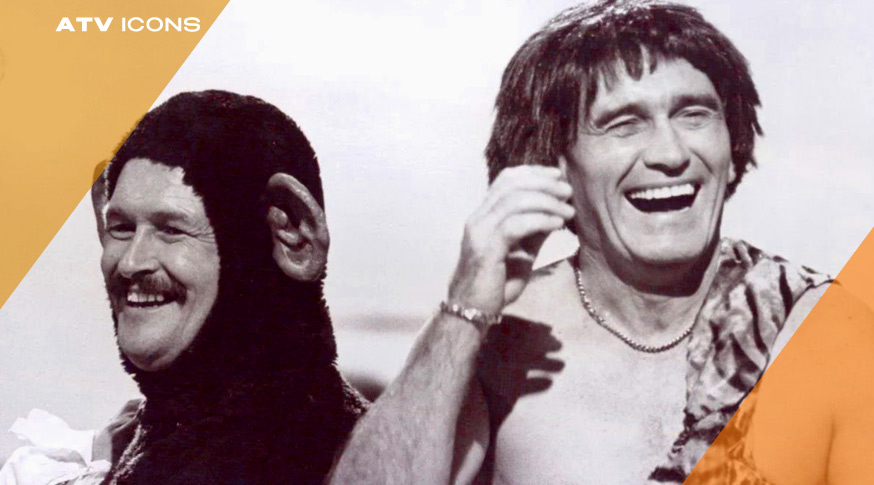
Cannon and Ball / LWT
Tommy Cannon (Thomas Derbyshire) kept a relatively private personal life, but some details are known from interviews and memoirs. He was married twice. His first marriage was to a woman named Margaret, and together they had two daughters, Jeanette (born 1961) and Julie (born 1964). As Tommy’s career took off in the 1980s, strains appeared in the marriage.
Tommy and Margaret separated in 1987 and, after a prolonged split, they formally divorced in 1993. By that time, Tommy had already begun a new long-term relationship with Hazel who he later married and the couple went on to have three children together: daughters Kelly-Anne (born 1991) and Zoe Louise (born 1993), and a son Luke Thomas (born 1996).
During his later years, Tommy settled down away from the showbiz hustle. He has lived in the countryside near York with Hazel and their family. Colleagues describe him as the more reserved half of the double act – a friendly but relatively shy man offstage. Interestingly, outside of entertainment, Tommy once dabbled in sports administration. A lifelong football fan, he served as Chairman of Rochdale A.F.C., a lower-division English football club, for a period in the 1980s.
After Bobby passed, Tommy admitted he was “devastated” and struggled to imagine life without his best friend. The two had been virtually inseparable for over 55 years, and Tommy has said he felt “like I’ve lost one of my arms”. Despite the grief, Tommy Cannon has continued to honour his late partner’s memory and still makes occasional solo appearances on TV and stage, carrying the legacy of their double act.
Bobby Ball (born Robert Harper) had a personal life marked by both joy and turbulence, before finding stability later on. He married young: his first marriage was to Joan Lynn in 1964 when Bobby was just 20. The couple had two sons, Robert Jr. and Darren, but the marriage was short-lived – it ended in divorce by 1970.
This was before Cannon and Ball became famous, and Bobby would later reflect that his early stardom and the temptations of show business did not help him be a good husband the first time around. In 1974, Bobby remarried, this time to Yvonne Nugent, who would remain his wife for the rest of his life. Bobby and Yvonne had one daughter together, Joanne (born in the late 1970s), completing Bobby’s family of three children.

Cannon and Ball / LWT
During the peak Cannon and Ball years in the 1980s, Bobby Ball’s offstage life was, by his own admission, chaotic. The pressures of fame led him into heavy drinking and extramarital affairs. He later confessed that success went to his head – “My pride wouldn’t allow me to see that it wasn’t anything to do with me as a person. [Women] were attracted to me because I was on TV,” he said, acknowledging how he indulged in the wrong things. This behaviour put a strain on his marriage to Yvonne. At one point in the mid-1980s, Tommy and Bobby’s working relationship also suffered, and Bobby’s personal life was heading in a troubling direction.
A turning point came in 1986, when Bobby Ball dramatically changed his lifestyle: he became a born-again Christian, committing himself to his faith and family. Bobby declared that he was putting the drinking, partying, and infidelity behind him. His wife Yvonne stood by him through this transformation – their marriage survived those rocky years and grew stronger once Bobby embraced Christianity and sobered up. In fact, Bobby often credited his faith with saving both his marriage and his friendship with Tommy.
In his later years, Bobby lived quietly with Yvonne in Lytham St Annes, Lancashire. He continued performing almost up until his death, finding great satisfaction in his acting roles on shows like Not Going Out and in touring church halls with his comedy-and-Christianity events. Bobby also wrote an autobiography, My Life, published in 1993, in which he recounted his rise to fame and the changes in his personal life.
Friends and colleagues uniformly described Bobby as the more extroverted half of the duo who loved making people laugh on or off stage. Despite health issues like heart bypass surgery in the 2000s, he kept active. Sadly, in October 2020, Bobby Ball fell ill and was admitted to Blackpool Victoria Hospital with breathing problems. He was diagnosed with COVID-19 during the global pandemic. Bobby passed away on 28 October 2020 at the age of 76 due to complications from COVID-19.

Cannon and Ball
One of the most significant chapters in the Cannon and Ball story is how religion and reconciliation became intertwined in their lives. During the mid-1980s, at the height of their fame, Tommy and Bobby’s friendship hit a rocky patch. The intense pressure of weekly TV production, coupled with divergent lifestyles – Bobby’s partying versus Tommy’s more reserved nature – caused strains. “Of course Bob and I have fallen out. We fell out in the Eighties for a time,” Tommy admitted. Many classic double acts experience periods of acrimony, and for a while Tommy and Bobby were barely speaking offstage, communicating only as necessary for performances. It was a precarious time for the duo, and some feared they might split for good.
The mending of their relationship came through what Bobby would later call a twist of fate – and a shared faith. Bobby Ball’s conversion to Christianity in 1986 was the first turning point; he sought forgiveness and a fresh start. He reached out to Tommy in a more genuine way, and Tommy noticed the change in his partner. In the years that followed, Tommy Cannon too became curious about the peace Bobby had found. By the early 1990s, Tommy also embraced the Christian faith, roughly “seven years” after Bobby.
Tommy described his own religious awakening as a private, gradual process, he wasn’t as publicly demonstrative as Bobby about it, but it deeply affected him. Importantly, this shared spiritual journey brought the two men back together on a personal level. They forgave past grievances and rediscovered their brotherly bond.
Cannon and Ball’s legacy in British comedy is significant. They were among the last great products of the traditional variety circuit to achieve national stardom on television. In an era when the UK had only a handful of TV channels and family variety shows drew tens of millions of viewers, Cannon and Ball stood out as icons of Saturday night entertainment; Their TV show was a ratings powerhouse for ITV, consistently topping viewership charts during its run.
Critically, Cannon and Ball were sometimes seen as old-fashioned in style – their act harkened back to the harmless mischief and music-hall tradition of earlier comics, as opposed to the edgy satire that “alternative” comedians brought later in the ’80s. However, audiences, especially working-class and northern audiences, adored them for exactly that reason. Though comedy tastes changed by the 1990s, those who grew up watching Cannon and Ball remember them with great fondness. Their influence can be seen in later comedians who also formed double acts or who combined sketch and stand-up, and in the ongoing use of their catchphrase in British pop culture trivia.

